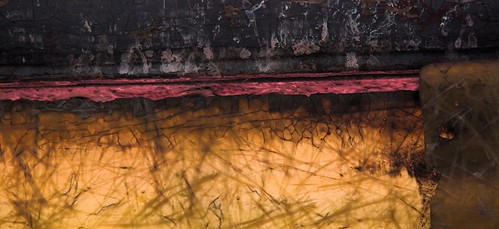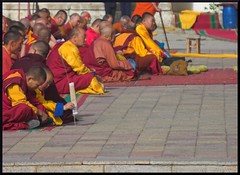Mongolian Tradition and Gold Digging
Mongolian tradition.
Mongolia saw me off with a kind wave. I forget where I left you. I rode around the Mongolian countryside a fair amount more, well-equipped with a traditional deel, the calf-length robe that has kept Mongolians warm in double-digit negative temperatures for centuries.
There were brilliant moments. I give you as an example, this one evening out in Biluite valley, where a Swedish woman named Anneli lives. I met her mother on the Trans-Siberian railway last year, and decide to visit Anneli. She lives in three-wall ger, in a remote valley, with her husband and a handful of cows who had generally given up on giving milk for the winter by the time I got there. Gers come in different flavors, mostly depending on how many lattice-walls they are made up of: three walls is as small as they get. Four walls is common, and five is big. Anneli got three calves this summer, and two foals. The foals were eaten by the wolf, and two of the calves also met their destiny in the form of sharp teeth. Suffice to say it's a hard life out there.
Ellen, another Watson fellow, was traveling with me for a few days, and we hitchhiked out to this valley, where I had left my horses a week or two earlier. Her Watson project deals with how life experience influences folk music in the circumpolar north, so we listened greedily to the songs that are generously dished out by pretty much every driver in the country. Mongolians sing a lot, and they sing well. In any given vehicle filled with any given fifteen (or seventeen, or twenty-three) people, thirteen (or fifteen, or twenty-one) of them will have breathtaking singing voices, and the two that don't are usually the foreigners. You sing when you are driving somewhere, you sing when you are riding across the steppe, and you sing during dark evenings.
One such dark evening in Biluite valley we spent singing. Upon arriving, I had given Bold, Anneli's husband, a bottle of vodka, as thanks for watering and taking care of my horses for a week. He stuck it inside his deel, and carried it around until bedtime. When we, the women, were about ready to go to bed, Bold was sitting at the altar part of the ger (the northern part of a ger is sacred; it is where you burn a bit of incense, and wax candles, and have pictures of your old mom and the Dalai Lama) and suddenly a half-empty vodka bottle appeared in front of him. And by appeared, I mean that he drank half of it in less time than it took us to realize he had even sat down.
He then proceeded to give us women a night cap in the form of “zuun gram” -- 100 grams of vodka. Anneli then suggested that he sing for Ellen, since he had drunk the vodka we gave him. But in Mongolia, you don't just sing, it ain't that easy, you also have to drink airag, fermented mare's milk. So we drank airag. And we sang. Anneli filled up a 4-liter metal jug, and from the jugs you pour half-liter bowls, which whoever is singing holds on to, and drinks after the end of the song. And Bold, being the only Mongolian in the vicinity, made up tons of rules that benefited him, under the auspices of “Mongolian tradition.”
-- Why does the youngest person have to drink more?
-- Mongolian tradition.
-- Why can't we sing together if the song is in English?
-- Mongolian tradition.
And so on.
Luckily airag is more along the lines of beer than liquor as far as alcohol content goes, but the next morning, Anneli counted that we had consumed about thirteen liters of horse's milk. That's a lot of milk, whether it is fermented or not. When we were ready to go to bed for the second time, Anneli uttered the best-ever end-of-an-evening comment. As we reluctantly ventured outside into the cold to go to the 'bathroom,' she said “Damn, I am glad that I only have one cow to milk in the morning.” It made my day.
Gold diggers.
A few more things are worth noting about Biluite valley. It is part of Khangai Nuruu National Park, some 150 km from Kharkhorin, Chinggis Khan's ancient capital. It is a valley whose families were asked to relocate for the summer. Find somewhere else to stay. Every family received a little paper note, explaining that the valley is overgrazed, and that they need to move elsewhere. Most of them used it as toilet paper, or to light the stove in the morning.
Grazing is hard on the valley, that is true, with too many households and too many animals residing there. For families whose single biggest expense in a year is transportation between seasonal dwellings, the question remains: “Who is going to pay the extra costs of moving further away?” The government collects taxes, I was told, but contributes very little to people's lives. Children need to go to school, families need water, but they do not help pay for boarding in the village, they do not help maintain wells. And it was to no one's surprise when, a few weeks after the little paper slips demanding relocation were distributed, big machinery rolled over the hills into Biluite with government permission to prospect for gold.
When you wake up in a ger that is below freezing in the morning, you understand people's attitudes towards regulations that prevent wood-cutting for fuel – the attitudes are about as negative as the temperature. If you in addition have little or no reason to believe that the government's pretty words about environmental protection are anything but empty public relations stunts, you might as well use their fancy notes to wipe your behind, right?
After I left Biluite came the challenge of selling the horses in late September (advice: if you ever have to sell a horse in Mongolia, don't do it in the period September – November). All the potential customers wanted horse meat, but I thought my horses were too good horses to become sausage, so I kept looking. At this point I had about two days left before my flight was leaving, and I was still in the countryside. Finally, a couple I had gotten to know quite well bought them, with a lovely red vest that she had made as partial payment. Soft hearts may not make a lot of money, but I think they are happier in the end.




